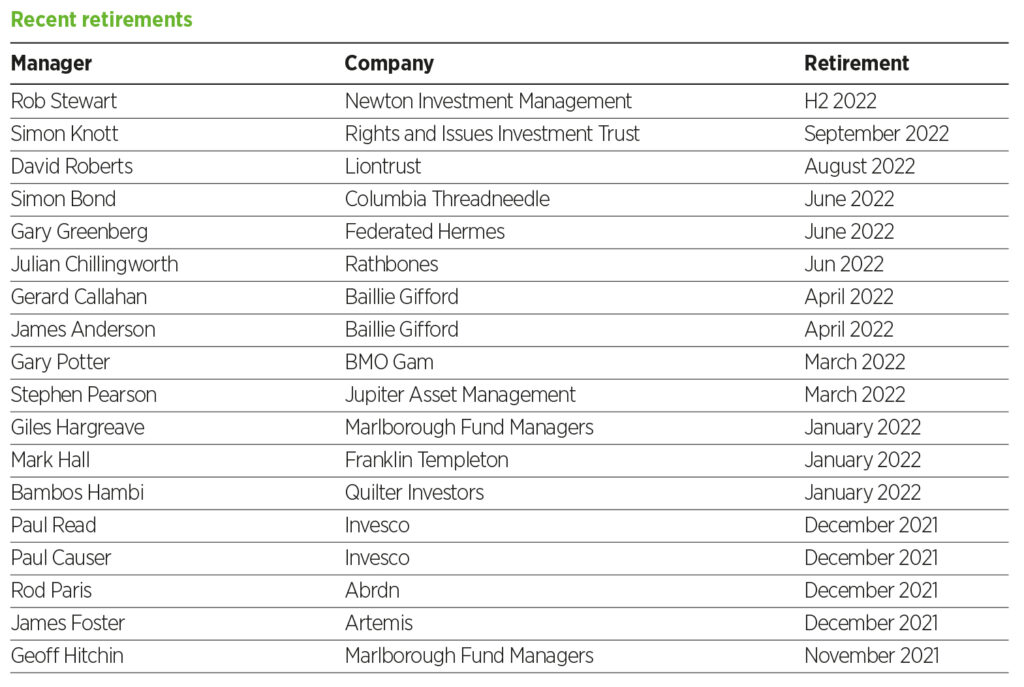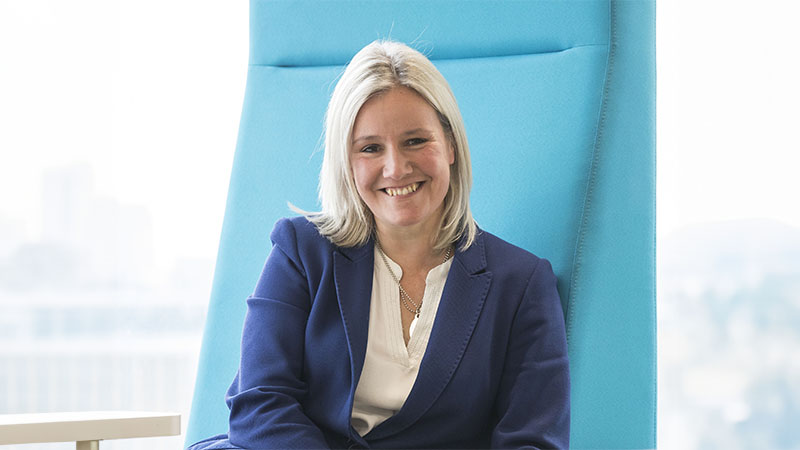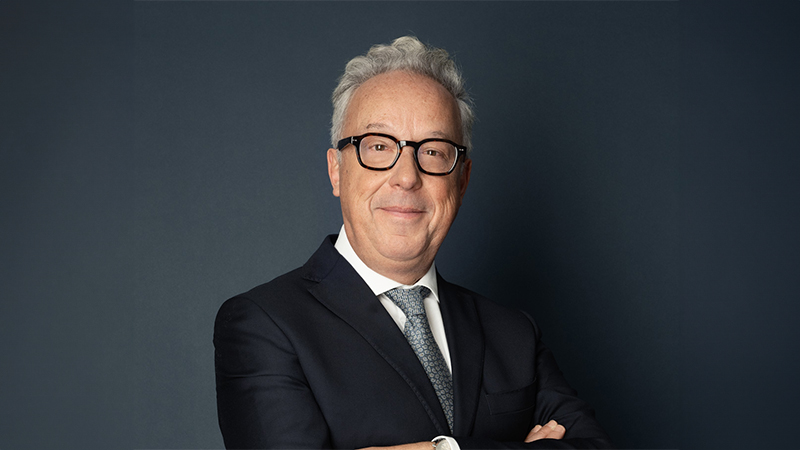A fund manager who joined the industry post global financial crisis has only really seen one type of market – low interest rates/low returns. But the breakneck speed at which central banks are raising rates means that is changing.
So, we find ourselves in a situation where managers with more than 10 years’ experience are facing conditions unfamiliar to them.
It’s usual during such times that everyone turns to the more experienced heads in the room, those who have seen double-digit inflation and interest rates over 2%. But the recent spate of retirements – many with four decades’ experience – could pose some problems.
The loss of heavy hitters such as Gary Greenberg, Simon Bond, James Anderson and Gary Potter – among many others (see table below) – is not inconsiderable. And it does feel like a lot in a fairly short space of time.

There are likely a multitude of drivers behind this – but front and centre is everyone’s favourite villain, the pandemic.
Some departures may have been delayed to help colleagues/funds cope with Covid-19. Alternatively, as suggested by Fundcalibre managing director Darius McDermott, “working from home during the pandemic may have helped some people discover that retirement is less scary than they thought”.
For the more cynical among us, it’s possible they may have looked at the rough seas ahead and either questioned their appetite to ride out another storm or become concerned about the impact one could have on their legacies.
It’s certainly not just financial services that is bleeding experience, with the number of over-50s retiring across the UK last year at record levels, points out McDermott, but it is going to be particularly challenging for the fund management industry.
“When markets get difficult, you want to see a few grey hairs on your manager. You want people who have seen these cycles before and know what needs to be done.”
Rating rethink
Beyond the loss of experience, a manager’s exit – not necessarily due to retirement – gives rise to the prospect that a fund will lose its ratings.
“We have two choices,” says McDermott. “One is to remove the rating. The other, if we know the team well, means it goes on our watchlist. In the majority of instances, the rating would be removed.”
Since 2015, FundCalibre has reassessed 30 fund ratings following the departure of a manager. Before 2019, when its Elite Radar was introduced, only two of the 15 funds that lost their rating have so far managed to get it back. They were Stewart Investors Asia Pacific Leaders in 2015 and Blackrock European Absolute Alpha in 2017.
Since rebranded as Stewart Investors Asia Pacific Leaders Sustainability, the £6.6bn fund is co-managed by David Gait and Sashi Reddy. An Elite rating was regained because Gait has managed a similar fund, Asia Pacific Sustainability, since inception in 2005.
Meanwhile, the £490m Blackrock European Absolute Alpha Fund regained its Elite rating in 2020 after manager Stefan Gries hit a three-year track record.
From 2019, FundCalibre could move a fund to its Elite Radar rather than fully strip its rating. The most recent examples are ASI Global Smaller Companies and Ninety One’s UK Special Situations and Cautious Managed funds, the latter since renamed Global Income Opportunities, which were put on the radar in 2020.
Previously called Standard Life Investments Global Smaller Companies, the ASI fund was downgraded after manager Alan Rowsell, who succeeded launch manager Harry Nimmo in late 2016, left the firm to join Premier Miton Investors in September 2020.
The Ninety One funds suffered a rating drop after veteran manager Alistair Mundy was forced to step down due to ill health. The funds remain on the Elite Radar “while they build their track record”, FundCalibre said at the time.
Material manager?
Over at Square Mile, it’s a similar story – but a departure/retirement would result in one of three outcomes, explains research director John Monaghan. First, the team would “look to see how material the manager was to the rating”. If it was felt they were “the ultimate driver as to why the fund has that rating”, it would likely be removed.
However, if the fund has a really good co-manager or strong supporting team in place, “and it’s one of the team replacing the longer-standing outgoing manager, we might put that on the suspended rating”, Monaghan adds.
This gives Square Mile the opportunity to “revisit the fund and talk to the remaining members of the team and really get to grips with what’s going to happen after the retirement or departure of that particular manager”.
Monaghan flags Baillie Gifford as a good example of “a house that gives a really long lead time when their partners and senior managers are due to retire”. This means Square Mile has “more than enough time to get to grips with the team’s structure going forward”.
He also cites the BNY Mellon Global Income Fund, which lost manager James Harris in 2015 after he joined Troy Asset Management. Square Mile had originally rated the fund AA but opted to downgrade it, rather than remove its rating, after Nick Clay stepped in. Clay’s shock exit in 2020 to join Redwheel (then known as RWC Partners), taking a trio of colleagues with him, saw the Square Mile rating stripped.
FundCalibre also opted to remove its Elite rating for the fund.
On rare occasions where the exit of the long-standing manager is deemed not to be material to the rating, it would be retained, Monaghan adds. “Where there are, for example, other co-managers who have got equal levels of experience, where there is very much a team-based approach. But that is probably the least common outcome of the three.”
The Square Mile approach is “we would never say never again”, he adds. “We have lists of funds we’ve previously rated, and we also have a positive prospect rating as well, where we are broadly positive on the fund but there are a couple of factors we can’t get over the line to grant a full rating.”
He points to the Threadneedle UK Social Bond, which had a responsible double AA rating. But with the pending departure of Simon Bond, and with “a couple of doubts about the longevity” of the track record of his replacement, it has been moved to a responsible positive prospect.
“On balance, we’re confident [Tammie Tang] can continue to meet the fund’s aspirations but haven’t yet got full conviction to go to the full rating.”
No stomach for it
Monaghan agrees the pandemic will have seen many fund managers take a long hard look in the mirror and ask themselves if they have the stomach to keep going. The risk of tarnishing their reputations in the forthcoming uncertainty would also have been a factor, he says. “They’ve had a really good run and don’t want to put themselves under that pressure.”
It might also be the type of strategy the manager is running that was the final straw, Monaghan adds. “If you’re a value manager in the UK in March 2020, you probably look pretty miserable. You’ve spent the best part of three years in the doldrums, and you’ve got to try and get your mojo back and improve. That’s tough.”
Extended glide path
One manager who retired at the end of June is Gary Greenberg, formerly head of emerging markets at Federated Hermes, who started his career at Continental Illinois National Bank in 1985.
A career in emerging markets brings with it a lot of travelling and Greenberg spent many years, “on the road pretty constantly”. “I think even a 25-year-old would have gotten worn out, but I’m 69 now and it’s time to call it a day.”
Greenberg decided to retire a couple of years ago and Federated Hermes asked him to “create an extended glide path”. There was no such blueprint at the company, so Greenberg had to come up with one.
He says it worked out well for both parties, helping him transition into retirement and allowing Federated Hermes to shift his responsibilities over time, while reassuring clients.
In 2019, Greenberg’s colleague of nine years, Kunjal Gala, stepped up to become co-portfolio manager, global emerging markets, before taking on the lead role solo. Greenberg “kept his hand on the tiller” for a while before slowly stepping back to “kibbitz” from the side lines.
When it comes to the prospect of losing a rating or being downgraded, Greenberg shrugs. “What can you do?” he asks. “The only thing we really could do was give our clients comfort that the succession would proceed smoothly, that my direct successor was really qualified to take over and that we were giving them plenty of time to assess it.”
Epic price to pay
So, what does his experience tell him about the road ahead and what pearls of wisdom would Greenberg want to pass along?
“The first one, I think, is the most important and this goes back more than 10 years – more like 20 to 30 – and that is valuation. The past 10 years have been difficult for value managers. I am a quality growth kind of manager, and the team is officially a blend but with a strong bias towards quality growth.
“But the question is how much do you pay for a stock? You’ve had a 40-year tailwind of interest rates declining.
“In the US, you had 17% in the early 1980s and that has been steadily declining since to zero or, in real terms, negative. Of course, markets have gone up a lot, but valuation has become less and less important.”
Greenberg says he has seen younger investors readily accept paying 50x price/earnings, which they don’t understand is an “epic price to pay”.
“Mathematically, if your cost of capital is zero than the value of any asset if just about infinity. But a US 10-year treasury bond at 2% has a very different meaning for the market than one at 4% or 6%.”
Another important lesson is the impact politics is now having on markets, which Greenberg says is relevant for more seasoned heads as well as relative newcomers.
“For many years, it didn’t matter if it was a Democrat or a Republican in the White House. In the 1980s it looked like everyone was headed in the same direction. China was ‘going capitalist’, along with Indonesia, Korea, Taiwan, Egypt, you name it.
“And now we’re in a very confusing, complex world where countries are not going in the same direction.”
He says emerging markets teams are much more used to volatile politics, so should be better placed. “But the world is more complex politically and, therefore, economically than five, seven or even 10 years ago.”
Market swoons
What does Greenberg’s experience tell him is waiting down the road for markets?
“My base case is, next year, earnings start to get revised down. Not immediately, it will take a few months and then boom, boom, boom – companies will start to guide lower and then, the last shoe to drop, analysts start to cut their numbers.
“What looked like a cheap stock market at 15-and-a-half, or 16 times suddenly becomes expensive again at 18. At that point you probably have some kind of swoon in the market and that’s where you get the beginning of a bottom.”
He adds: “Next year is still going to be very, very volatile.”
A quirk of markets, Greenberg notes, is “by the time you know you’re in a recession, usually you’re on the way out of one”.
“But some of the work of this bear market has already been done, down by 20% and 30% in some cases, so I don’t expect an enormous drop from here – maybe 15-20%.”
Expanding Russian aggression is the “wildcard”, he adds.
Greenberg says: “There is no way to learn about how to be a good manager without going through really bad times and watching your stock plummet. You get a report card every day. And if you can’t learn the lesson the market is teaching, then you won’t last another decade.”
His advice is to be as transparent as possible. “There are things you can control, things you can’t and things you simply do not know. If you’re honest with yourself and your clients, then expectations can be rational and disappointments won’t be as big.”
This article first appeared in the July edition of Portfolio Adviser Magazine









